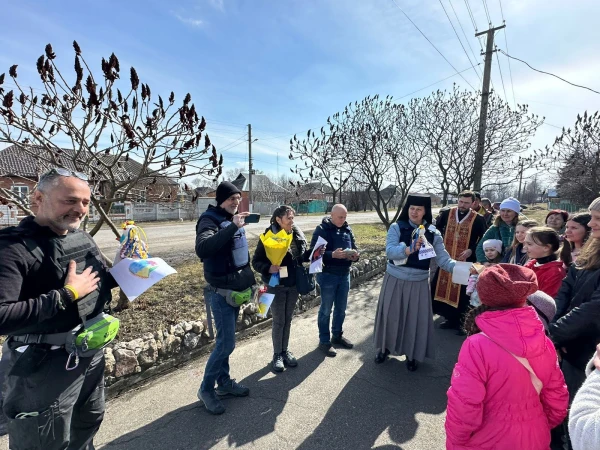In the midst of the destruction left by the war in Ukraine, a group of volunteers from the organization Frontiers of Peace (Borders of Peace) has found a way to transform horror into hope: the wooden boxes that once carried ammunition for the Russian army are now reborn as vases full of life.
Giambattista Mosa, president of the organization, shared with ACI Prensa the origin of the “Vases of Peace” initiative, which they presented to Pope Francis during the General Audience last week.
Receive the main news from ACI Prensa by WhatsApp and Telegram
It is increasingly difficult to see Catholic news on social media. Subscribe to our free channels today:
Frontiers of Peacein collaboration with the Greek Catholic Church, has carried out more than 31 humanitarian missions in Ukraine for two years, in which it has delivered more than 150 tons of essential goods in cities such as Kharkiv, Kherson and Donetsk.
Sister Olexia Pohranytchna, from the Sisters of Saint Joseph Congregation, as well as priests from the Greek-Catholic Seminary of the Holy Spirit in Lviv, such as Father Ihor Boyko, are the ones who usually accompany this group of volunteers.

Since the war began in February 2022, at least 12,162 civilians have been killed, including 659 children; and at least another 26,919 civilians have been injured, according to the Office of the High Commissioner for United Nations Human Rightss.
Furthermore, according to the UNHCRthe United Nations refugee agency, since August of this year some 170,000 people have fled their homes in the east of the country, adding to the 4 million people displaced in Ukraine and the 6.7 million more who have sought refuge outside the country .
“During these missions, especially around the city of Izium, we found hundreds of wooden boxes containing ammunition from the Russian army, abandoned in the countryside,” Mosa said.
The inhabitants of the area used them to keep warm in winter, “as firewood for the stove or to repair their homes, as construction material.”
After recovering a dozen of these boxes, they moved them in their vans to a warehouse in the Italian town of Villa Guardia, in the province of Como, in the parish of Maccio Santa Maria Assuntawhere the headquarters of Frontiers of Peace.
“We thought about how we could reuse them and decided to turn them into a symbol of rebirth. The boxes represent the aggression that Russia unleashed on Ukrainian territory, since they contained the ammunition fired by Russian tanks against houses, schools and hospitals in Ukraine,” said the Italian volunteer.
With the collaboration of a floriculture company, the boxes were transformed into vases and planters to “symbolize the hope of peace, a dignified and just peace for the Ukrainian people.”
This “blooming,” Giambattista continued, “also represents our peace missions, because listening, sharing and encountering people’s sufferings, hopes and desires is fundamental for us.”
The objective of this project is to auction the planters to finance the missions of Frontiers of Peace in Ukraine. According to Mosa, a truck loaded with goods for those affected by the war can cost approximately €4,000.
They are also seeking to raise funds to pay for the studies of a young man from the city of Kharkov with a scholarship “in memory of little Maria, who died along with her mother Irina during a Russian bombing of the city’s supermarket in May of this year,” remembers the president of the association.”
In addition, the initiative aims to finance a summer camp in Italy in June 2025 for young people from the same city. The association already has donations from local communities, as well as from several companies, Cáritas Diocesana and with the help of Cardinal Oscar Cantoni, Bishop of Como.
At the General Audience last Wednesday, volunteers had the opportunity to show this project to Pope Francis. “Inside the box that we gave to the Pope we placed soil from the city of Kharkiv, a soil impregnated with the blood of civilian victims and the fear of daily bombings,” Mosa said.
The Holy Father blessed the box, as well as the project and the humanitarian missions. “He listened attentively to our story, full of emotion. He blessed the box and told us directly and forcefully: ‘Let’s move forward.’”
They also gave him the book “Faces and voices of the Ukrainian resistance”written by the volunteers and which narrates the encounters they experience during their visits to Ukraine.
“We gave it to Pope Francis to bring him closer to our experiences, the people we know, their hopes and sufferings in the martyred Ukraine,” Giambattista, co-author of the book, told ACI Prensa.
“I believe that bringing such powerful symbols to Pope Francis,” added Mosa, “can contribute to keeping alive the attention and solidarity towards this people who have been so beaten and suffered, who cry out for freedom, justice and not to be forgotten.”
“We are sure that the martyred Ukraine occupies a place in the heart of the Holy Father. For our part, we continue forward with our humanitarian and peace missions,” he concluded.
Pope Francis has on multiple occasions expressed his concern about the war in “martyred Ukraine,” requesting prayers for peace and urging the international community to intensify efforts to end the violence.
